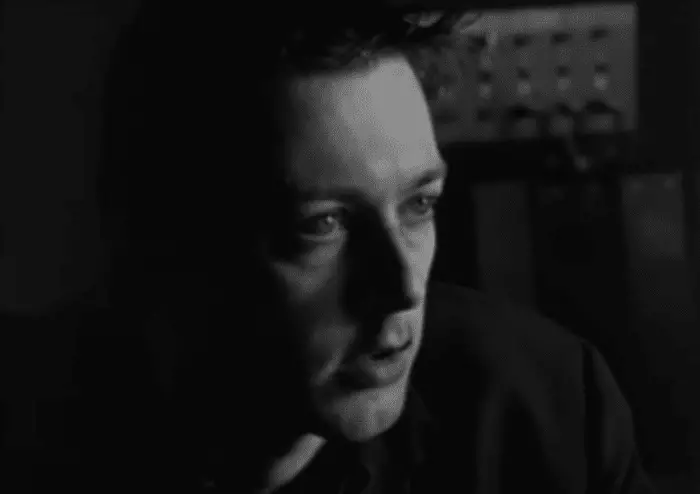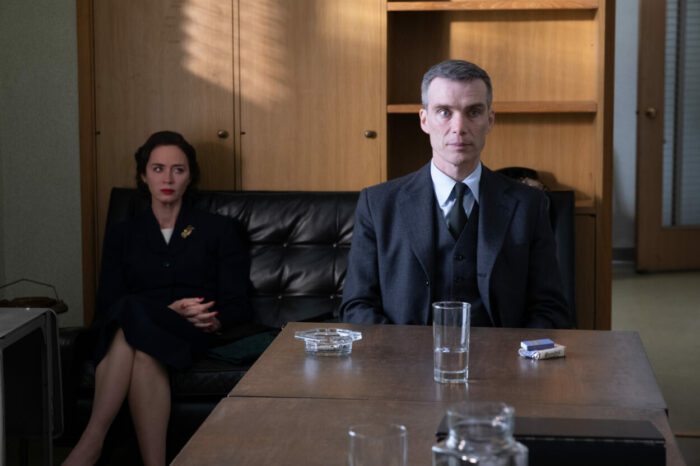It’s become a much belabored talking point of modern film criticism. Movies today have less sex in them than at any time since the dominion of the Hayes code and yet still, this narrative persists that movies nowadays have too much sex in them. One of the most high profile and least likely targets of this campaign to chastise cinema was Christopher Nolan, who with his recent best picture winner Oppenheimer, forced an audience of innocent cinemagoers to endure whole moments of Florence Pugh’s breasts and Cillian Murphy’s chest and legs.
As absurd as the outcry was at the time it feels more so in the wake of fellow Best Picture Academy Award nominee Poor Things, a.k.a. Soft-Core Pinocchio, where Emma Stone’s Bella Baxter brings herself to a climax with a pear in the first twenty minutes. If Christopher Nolan was forced to endure the bell-ringing of the New Puritans then he has only himself to blame as he’s contributed as much as any single artist (because Disney Chairman Bob Iger was not an artist in any sense) to the modern culture of timorous cross-leggedness. For the last two and a half decades he’s built a media empire whose principal preoccupation is impotence.
That might sound like a spurious and insulting claim, and so it was meant, yet I think it’s also pretty well founded. To be clear, most of Christopher Nolan’s films are good, but their (anti)heroes are to a man (for men they all are), impotent cucks who channel their sexual ineptness into professional obsessions. No wonder modern men relate to them so much! The “dead wife” jokes that have followed Nolan’s films have not come from nowhere, none of his heroes have ever been capable of satisfying a woman or maintaining a stable relationship and nearly all of them are indirectly responsible for their significant other’s deaths. Nolan is obsessed with dead wives, ones who can be loved without being made love to, and so sex, or rather, the absence of it, has been a central theme throughout Nolan’s oeuvre. Flippantly, what does that say about these stories and what does their popularity say about us?
Following
Nolan’s first, least seen and worst film, Following might be the most explicitly about impotence of all his films. Following is a mediocre micro-budget modern noir about a bored unemployed writer who takes to following strangers around London and becomes embroiled in a blackmailing scheme when one of his targets, named Cobb (a name Christopher Nolan would reuse for another gentleman burglar later in his career) notices him and takes him under his wing as a burglar. It was shot in one or two takes per scene over a year’s worth of weekends, while the cast and crew worked their day jobs, and Nolan paid for the 16mm film out of his own salary, so it’s clearly the product of a tremendous amount of passion. It’s just that it’s a passion it’s difficult to share in when viewing the finished product, as the exciting dramatic potential of the verité first act quickly gives way to the dull and trite sub-Hitchcock plotting.

Like many a film noir, Following is about a sap, a weak-willed man whose desires are manipulated to ensnare him by a stronger man who murders a woman and leaves him to take the fall. In most noirs though, the protagonist at least sleeps with the woman before she’s murdered. Not so in Nolan’s vision, where the unnamed woman dies having regarded our hero with nothing but pity. And so she might, he’s a bored voyeur who gets a thrill first by following random strangers and then by breaking into their homes, and even that only once a braver, crueler man holds his hand through it.
Memento
Following wasn’t great but it more than served its purpose as a calling card and managed to net Nolan the means to make Memento, his next and much better film. Memento features perhaps the most archetypal of Christopher Nolan’s heroes (there’s a lot of competition for that though), Leonard (Guy Pearce), an amnesiac whose home was invaded and whose wife was raped and murdered in front of him and who has spent the rest of his life searching for the man who did it. The ultimate twist of Memento is that Leonard’s wife was not murdered, but rather that, Leonard was unable to cope with both his condition and her trauma. She used his amnesia to get him to assist her suicide, an experience so horrifying that Leonard repressed it by creating a fictional alter ego to pass it off onto. Leonard didn’t kill his wife; that was Sammy.
Leonard is pure sexual dysfunction. He was humiliated and emasculated as brutally as can be imagined, blocked out the actual facts of his experience and then willingly condemned himself to spend the rest of his life trying to rectify it, murdering his friend Teddy to conceal the truth from himself. He chooses to live in the endless cycle of yearning and regret that is Memento‘s narrative rather than confront the truth: that he couldn’t stop another man from forcing himself onto his wife, he couldn’t comfort her in the aftermath, and he couldn’t even realize that he was slowly poisoning her. He failed to uphold the safety and sanctity of his home, he failed to maintain his marriage and he failed to maintain both his and his wife’s sanity. Memento creates a fiction where a man faces incredible injustice and adversity, only to take comfort from that narrative rather than confront the specter of his culpability. He has no wife and no memories of anything else. His quest for revenge is all he has that gives him hope that he might regain some semblance of control, of potency, and the truth, that he killed the man who ruined his life long ago, would rob him of that. So he chooses to forget that it happened and allows himself to keep looking. Because if there’s not someone else left out there to blame, who is left other than him?
Insomnia
A remake of the 1997 film of the same name, Insomnia is also about a man who is a failure: who has failed to meet the standards set for him, by himself, by society, by his occupation, and by a woman. Will Dormer (Al Pacino) is a celebrated detective sent to Alaska to lead the investigation into a teenage girl’s death. There he meets Ellie (Hilary Swank) an idealistic local cop who idolizes the gruff veteran detective. However, Dormer has a secret, two actually. First, that he planted evidence against an accused child murderer and there’s an investigation hanging over him, and secondly, that early in the investigation, he goes off half-cocked and accidentally shoots and kills his partner. It’s an accident– and a convenient one– as his partner’s testimony could have condemned him in the earlier incident. So Dormer feels like a fraud. He’s outwardly a sage veteran cop who with decades of experience and an illustrious record. All the same, he’s actually (or also) a corrupt, trigger happy killer who’s wracked with guilt but still persists in covering it up.
Like Memento’s Leonard, Dormer is inwardly hiding from the truth while trying to reveal a different truth, one which doesn’t implicate him or expose his flaws in the same way. Ultimately, it is only in death that Dormer admits his failure, using his dying moments to hand Ellie the evidence that would convict him. Dormer also confesses his earlier crime to a woman working at the hotel he stays in (in the original, the Dormer analogue also tries to have sex with her, an ugly element of overt sexualisation that Christopher Nolan, in typical fashion, excises). That in both cases it is young, attractive women who become emblematic of the judgement he is trying to hide from is of course significant. One offers compassion, the other judgement, and through them it becomes not merely Dormer’s morality on trial, but his worthiness as a man. He doesn’t just need to come clean and find forgiveness, he needs to do so to a woman, and it is only in the total self-effacement of death that he is able to do so. Convention forbids him to live on as a man once he admits his failure as a detective.
The Dark Knight Trilogy
In arguably the defining project of his career, his three-part Batman saga, Nolan found his ideal material, the mythology of one of American pop culture’s most sexless icons, obsessed with perpetually brooding over the wrongs of the past. The Batman canon is replete with some of the most sexualised female icons in pop culture, all of them villains, tempting his stoic facade with their sexuality, tempting him to his downfall, be it a deadly embrace or a rejection of his perceived duty of protection. Even so, in Nolan’s version, the sexuality of these figures is of course toned down. There’s no Harley Quinn or Poison Ivy, and Catwoman’s demeanor is more sharp and professional with little of the flirtatious chemistry typical of other incarnations of the character.

Batman’s masculinity is defined by what we have now seen is that typically Christopher Nolan motivation, to efface past failure. Male self-mythology characterises men as protectors and there’s no more iconic self-appointed protector than Batman, who witnessed his parents deaths at a young age and made it his life’s work to fight against those who would leave other children orphaned. However, in Nolan’s universe, dead parents aren’t enough, so Bruce’s—unconsummated, of course—love interest Rachel dies too, and the movie ends with a confrontation between Bruce and the man she chose in his stead, and who pursued an even less ethically sound form of vengeance in her name.
In the third movie Batman finally gets laid, only for his new mate to stick a knife in his flank (that spot where Jesus was stabbed on the cross and where all action heroes get hurt so they can hide it under their jackets), and so intimacy with a woman is near fatal. Almost alone among Nolan’s heroes Bruce Wayne does finally end up getting his happily ever after, living out his retirement with Selina, presumably in romantic equilibrium but we the audience never actually see that. Their tepid onscreen romance is hardly the focus of the narrative, which is all about self-sacrifice and Bruce getting to blow himself up to save the city and run off to Europe with the hot jewel thief is one of the most unconvincing story beats in the trilogy. Nonetheless, he cannot be Batman and be romantically linked. Superman has Lois and Spider-Man has Mary-Jane. Batman’s only stable relationships are all professional (even with Alfred, who in all incarnations has a personal connection to Bruce, but one Batman sublimates into a professional bond) and all male, and any potential bonding with women is routinely framed as a disruption to his equilibrium.
The Prestige
I will skirt much of the same to cite The Prestige as yet another example in Christopher Nolan’s canon of a male antihero (two of them in that instance) who pursue professional obsessions to the detriment of their love lives. Alfred (Christian Bale) is so obsessed with one-upping his rival Robert (Hugh Jackman) that he neglects and gaslights his wife into suicide, and his would-be lover Olivia (Scarlett Johansson) into leaving him. Robert’s wife also dies early in the film and her death is a catalyst for the revenge narrative. So, here we have both the wife whose death is the original sin our protagonist must expunge, and protagonists so consumed by obsession that they drive all the women from their lives. It’s so typically Nolan to have a protagonist so obsessed with avenging the woman they lost that they blow any chance of another relationship with a different woman, sublimating their lost love into a petty rivalry with another man, hoping to restore their self-worth by dominating their opponent.
The Prestige may be less persuasive than Christopher Nolan’s other movies. It also might be the least subtle in terms of the tropes under discussion. Perhaps because it is such nonsense, we’re left with little, enduring what a hot mess of toxic masculinity it is. Like Nolan’s other films, it’s supposed to be tragic and yet the men involved are such dolts and the stakes so low that it’s hard to become invested in their magician pissing match, however ludicrous it gets.
Inception
The big reason Christopher Nolan has such a standing with modern audiences is that he has no one defining film, he has multiple movies so wildly successful that for almost anyone else, they’d have defined their careers. Despite that, if there is one definitive Christopher Nolan movie, it’s got to be Inception.

The hero of Inception has—say it with me—a dead wife, whose suicide he feels responsible for. It’s another case of ‘wife’s death as original sin’: it takes place before the film’s events as is revealed through expository scenes as Adriane (Elliot Page) explores the subconscious mind of its protagonist Cobb (Leonardo DiCaprio). The wrinkle here is that, through his own mind, the dead “Mal” (Marion Cotillard)—large stretches of the film are set in Paris and she’s played by a French actor and Mal in French means “bad” so…Nolan named the main character’s dead wife “bad”—actually haunts Cobb, often betraying or physically attacking him, embodying his desire to become one with her and so doing lose himself in his subconscious mind, never to wake up. The film’s infamously ambiguous ending leaves the viewer hanging as to whether he overcomes this desire or does decide to let go of his guilt over her suicide.
As with Insomnia we also have an attractive younger woman who discovers the protagonist’s secret past, so again, it is a woman who is given the powerful choice between showing him compassion or judgment.
Interstellar
Interstellar—which is for the record, easily my favorite Christopher Nolan film, is another exemplar of this subtext but in a different way, it marked the commencement of a trilogy of films, Tenet and Dunkirk being the others, whose heroes are completely uninterested in romantic love. Tenet‘s “protagonist” and the nameless fighter pilot of Dunkirk have no dead wives to avenge, while in Interstellar, Cooper’s (Matthew McConaughey) wife is again…a complete non-factor, a source from which his children materialized and who excuses herself from ever appearing by dying before the film begins. However, Cooper seems to have little angst over this, he does miss her and feel pain at her death, but he, alone among Nolan’s heroes, has children to care about and so isn’t subject to the same obsessive requirement to sublimate his emotional needs into intra-masculine conflict. He is driven by a desire to build a better home for future generations, but needs force him to leave his own children behind in order to accomplish this. It’s a familiar archetype, the romantic hero who loves his family so much he must abandon them (there are women who play equivalent roles in media, Stella Dallas being the most obvious example, but they are fewer and further between), but in Interstellar, this archetype is more fraught.

We see in Dr Mann (Matt Damon), what happens when men reject this call to martyrdom, endangering the lives of others and the fate of the mission because they long for human connection, while through Dr Brand (Anne Hathaway), we are presented with the argument that human connection is fundamental to the mission, a proposition the film ultimately embraces, as her assertion that “love is the one thing we are capable of perceiving that can transcend dimensions” turns out to not only be true, but to be fundamental to the success of the mission. Cooper is routinely posited in opposition to Dr Brand’s sentimentality, and to his daughter’s (Jessica Chastain) resentment at him for leaving, each of these two externalized versions of Cooper’s self-doubt and regret. Uniquely in Christopher Nolan’s canon (arguably), the film ends with its hero finding reconciliation with both these women, as Cooper meets his daughter and she tells him to seek out Brand at the frontier of the new galaxy. Lucky for him her husband was dead when he arrived or he’d be left with a very awkward rest of his life marooned on a desert planet as a third wheel!
Oppenheimer
And so we get to Oppenheimer, the Christopher Nolan film in which sex plays the most significant role.
Many have argued that Oppenheimer “should have” shown less of its protagonists living body and more of the dead ones his actions created. For my money that’s tantamount to saying we should’ve seen what was on the other side of the walls in The Zone of Interest. Both these films are about harm enacted at a distance, ruining lives without being present to witness the harm you do. Lewis Strauss (Robert Downey Jnr, well done on the Oscar, should’ve got it for Natural Born Killers) and Robert Oppenheimer (Cillian Murphy, well done on the Oscar, should’ve got it for The Wind That Shakes the Barley or 28 Days Later) ruin one another’s lives through hearings the other orchestrates but does not attend. Oppenheimer kills hundreds of thousands of people from thousands of miles away. He sees the bodies only as we do, in his mind.

Viewed through this lens, the centrality of Oppenheimer’s affair with Jean Tatlock is clear. Calling their sex scenes “unnecessary” is not only puritanical, churlish, and anti-art, it’s embarrassingly incurious and demonstrates a fundamental refusal to actually read the film itself. Like the lives lost at Hiroshima and Nagasaki, Robert feels responsible for her death, believing his neglect led to her suicide, leaving him in a comparatively sexless marriage to Kitty (Emily Blunt). Her death is a microcosm of Robert’s impotence. He is unable to intellectually satisfy a woman as radical as Jean, nor romantically satisfy Kitty because he’s still carrying a torch for Jean, a fact Kitty is well aware of and which humiliates them both. She envisions her draped naked over him as he testifies, feeling her judgment, and that of the men in the room. Jean is a rebuke to Robert’s politics and his sex… in other words, to his potency. In Nolan’s vision, he is inside her when he delivers the iconic “Now I am become death, the destroyer of worlds” line. For the first time, a Nolan film explicitly connotes sex with the wider world and actions of his characters, it’s not just subtext, how much less subtle could you possibly be?
Building the bomb isn’t just about subjugating the Japanese and winning the war; it’s about rescuing Robert’s ego from the blow it received when Jean took her own life. Creating the atomic bomb is the ultimate expression of power. It gave the world the power to destroy itself, and he did it all to reclaim a semblance of the power he felt in Jean’s arms. Was this likely the key motivating factor behind the real Robert Oppenheimer? Probably not, I think building the atomic bomb was probably an almost entirely functional endeavor, but that’s not the way Nolan chooses to tell it. Instead, Nolan envisions Robert as the ultimate Nolanian antihero; a man who sacrificed not just his morality, but hundreds of thousands of lives, who caused untold misery and suffering, just because he couldn’t keep the love of his life happy.



